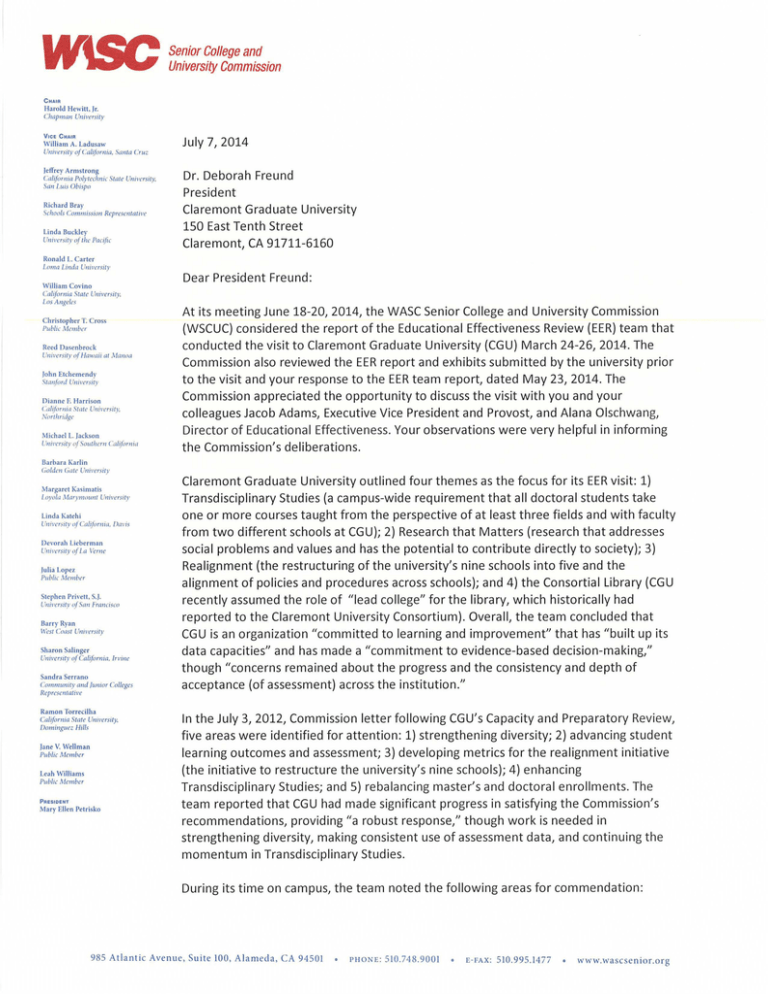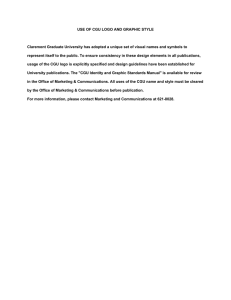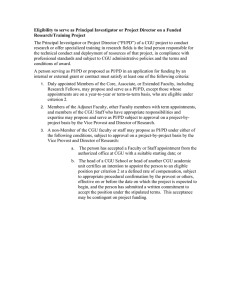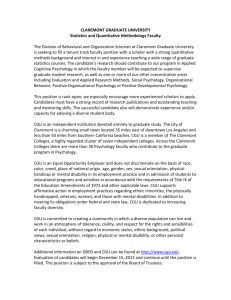Document 14559309
advertisement

Senior College and
University Commission
CHAI R
Harold Hewit t, Jr.
C/Ulpm{lll VlI i\'ersity
V ICE C HAIR
William A. Lad usaw
Vll h'crs;ty of Califomia, Sa1/ /(I Cruz
Jeffrey Armstrong
California Polyteclmic Stale VII/ versify.
Sail Luis Obispo
Richard Bray
Schools Commissioll Rcpreselltath'e
Linda Buckley
UtI;l'{.'rsity of tile Pacific
July 7,2014
Dr. Deborah Freund
President
Claremont Graduate University
150 East Tenth Street
Claremont, CA 91711-6160
Ro nald L. Carter
LtJmaJ.j"da UlIin:r$i t)'
William Cov ino
Californ ia State UlliI'ersit)~
J.osAngeles
ChTis-topher T. C rossPublic Memv",
Reed Dasenbrock
UlliI-ersit)' of Haw(/ii at ManClil
John Etchemendy
Stanford Uniwrsity
Dianne F. Harri so n
Calijomia State Uni\'ersit)~
NorrllTicige
Michael L. Jackso n
UlIiI'Crsit)' of So III hem Ca/i/omill
Dear President Freund:
At its meeting June 18-20, 2014, the WASC Senior College and University Commission
(WSCUC) considered the report of the Educational Effectiveness Review (EER) team that
conducted the visit to Claremont Graduate University (CGU) March 24-26, 2014. The
Commission also reviewed the EER report and exhibits submitted by the university prior
to the visit and your response to the EER team report, dated May 23, 2014. The
Commission appreciated the opportunity to discuss the visit with you and your
colleagues Jacob Adams, Executive Vice President and Provost, and Alana Olschwang,
Director of Educational Effectiveness . Your observations were very helpful in informing
the Commission's deliberations.
Barbara Karlin
Goldm (late Vllil'ersity
Ma rgaret Kasimatis
Loyola Mllr)'I1I01UJ/ Vllil'crs;ly
Linda Katehi
UU/vcr.. it)' of Cali/orllia, Dm'is
Devorah Lieberman
Vl/iI'ersit)' of L(/ "eme
Julia Lopez
PuvftcMemba
Stephen Privett , S.J.
Vl/iI'c rstl)' of 5(111 Francisco
Barry Ryan
Hbl Coast VII/I'ersil)'
Sharon Sali nger
UlIil'emt)' ofCa/~romia, lrl'lIIc
Sandra Se r ra no
Comm llll it)' (lnd lunior Colleges
Rcprt'Sclltal il'c
Ramo n Torreci lha
Cali/onlltl State Uml'Crsit)'.
Dominguez Hills
Ja ne V. Well man
Public Member
Leah Williams
Public Member
PRESI DE NT
Mary Ell en Petrisko
Claremont Graduate University outlined four themes as the focus for its EER visit: 1)
Transdisciplinary Studies (a campus-wide requirement that all doctoral students take
one or more courses taught from the perspective of at least three fields and with faculty
from two different schools at CGU); 2) Research that Matters (research that addresses
social problems and values and has the potential to contribute directly to society); 3)
Realignment (the restructuring of the university's nine schools into five and the
alignment of policies and procedures across schools); and 4) the Consortial Library (CGU
recently assumed the role of "lead college" for the library, which historically had
reported to the Claremont University Consortium). Overall, the team concluded that
CGU is an organization "committed to learning and improvement" that has "built up its
data capacities" and has made a "commitment to evidence-based decision-making,"
though "concerns remained about the progress and the consistency and depth of
acceptance (of assessment) across the institution."
In the July 3,2012, Commission letter following CGU's Capacity and Preparatory Review,
five areas were identified for attention: 1) strengthening diversity; 2) advancing student
learning outcomes and assessment; 3) developing metrics for the realignment initiative
(the initiative to restructure the university's nine schools); 4) enhancing
Transdisciplinary Studies; and 5) rebalancing master's and doctoral enrollments. The
team reported that CGU had made significant progress in satisfying the Commission's
recommendations, providing "a robust response," though work is needed in
strengthening diversity, making consistent use of assessment data, and continuing the
momentum in Transdisciplinary Studies.
During its time on campus, the team noted the following areas for commendation:
985 At lantic Ave nu e. Sui te 10 0. A lameda. CA 9450 1
PHONE:
510. 748.9 001
•
E-FAX :
510.995 .1477
•
www.wascse n ior.org
Commission Action Letter - Claremont Graduate University
July 7, 2014
Page 2 0/5
Realignment. The team praised CGU for completing a significant realignment of its nine schools
with "expediency and thoughtfulness" and "skill and sensitivity." While additional work is still
needed, such as the development of a new budget model, the team reported that CGU has created
"a more efficient and robust organizational structure" and has put in place joint academic and
administrative committees (shared governance) and a "transparent and inclusive" decision-making
process that have led to a "cooperative spirit ... that serves CGU well."
Transdisciplinary Studies. The team was impressed by the "substantial progress" since the last
WSCUC visit in defining and clarifying transdisciplinarity. According to the team, Transdisciplinary
Studies "has the potential to serve as a powerful intellectual engine" for the university's mission, if
momentum in this area can be continued and supported.
Research that matters. Faculty research efforts at CGU are "robust" with an increase in extramural
funding, expansion of support for faculty research, and renegotiated indirect cost rates. In terms of
student research, the team praised CGU for the "great strides in the last two years" in defining
institution-wide learning outcomes for doctoral research and developing various rubrics to assess
dissertation work.
Library consortium. The team applauded the working relationships among the library's various
constituency committees and administrators, which "are functioning well;" a strategic plan that
puts the library "on a wise path;" its "effective model" for delivery of services; and its connections
to research, teaching and learning initiatives across the college, particularly in identifying
"important assessment questions" and gathering and sharing data "to inform quality
improvement."
The Commission endorses the commendations and recommendations of the EER team and wishes
to emphasize the following areas for further attention and development:
Strengthening diversity. CGU has created a President's Diversity Council and identified key
initiatives in faculty hiring and student success, and each school has created its own diversity plan.
However, the team noted that "specific goals had not been established" nor was it clear "how
progress in diversity would be judged." How will CGU know if its efforts in strengthening diversity
are effective? The Commission notes the steps CGU has taken since the EER visit to promote and
support diversity, including the new faculty hires, changes in the faculty search process, and
bringing in outside consultants with expertise in diversity to work with staff and faculty. The
Commission expects CGU to widely communicate its diversity goals to stakeholders, ensure that
resources are available to achieve those goals, and develop ways to assess the success of its efforts
using clear, specific, observable measures for determining when milestones are achieved. (CFR 1.5)
Making consistent use of assessment data for improvement across departments and schools. The
team reported "concerns about the consistency" of use of assessment data for improvement.
Several schools integrate assessments into their courses and programs, with multiple sources of
feedback and with well-designed methods for analysis and subsequent use ofthe findings. These
schools demonstrate "both a greater depth of thought as well as a continuity of the process that
lends itself to ongoing improvement." Other schools and departments were not as advanced.
Commission Action Letter - Claremont Graduate University
July 7, 2014
Page 3 aIS
According to the team, use of assessment data was {{uneven" across schools. CGU is expected to
address the disparity in assessment efforts across the institution and ensure that all schools and
departments consistently gather, analyze, interpret, and use data for improvement. (CFRs 2.6, 4.4)
Creating a strategic enrollment management plan. CGU is fee and tuition dependent and relies on
enrollment to sustain itself. Efforts are underway to evaluate academic areas of strength, identify
future potential growth in enrollments, and test two models for engineering the enrollment
process. CGU needs to complete its Academic Program Strength Analysis and put in place a realistic
strategic enrollment management plan. Such a plan, in concert with CGU's initiative to revise its
marketing and branding efforts, can, as the team noted, {{address some of CGU's enrollment
challenges." (CFRs 3.5, 4.1)
Continuing the momentum to enhance Transdisciplinary Studies. The team lauded the
{{considerable" progress in Transdisciplinary Studies since the CPR visit. To {{firm up the curricular
and practical support for this compelling vision" and because of the importance of
transdisciplinarity to the structure of CGU, the Commission expects CGU to take steps to support
this momentum, including identifying strong leadership for the program and supplementing the
small critical mass of faculty that, as the team observed, {{currently give the endeavor its
intellectual vitality." (CFR 2.1)
Reinstating formal faculty evaluation processes. The team learned during its visit that aspects of
the faculty evaluation process have been placed on hold. Because, as the team stated, {{Both
constructive feedback and recognition of faculty excellence are essential for continuing
engagement and improvement/' CGU needs to put in place a comprehensive process for the formal
evaluation of faculty. The Commission is pleased to learn that since the EER visit, CGU has launched
discussions about the faculty evaluation process with faculty, faculty leadership, the deans and the
trustees. The process should meet the expectations of CFR 3.2 in the 2013 Handbook, which reads
in part: {{Evaluation is consistent with best practices in performance appraisal, including
multisource feedback and appropriate peer review. Faculty evaluation processes are systematic
and are used to improve teaching and learning." (CFR 3.2 from 2013 Handbook of Accreditation)
Given the above, the Commission acted to:
1.
Receive the Educational Effectiveness Review team report and reaffirm the accreditation of
Claremont Graduate University for eight years, through June 2022.
2.
Schedule the Offsite Review for fall 2021 and the Accreditation Visit for spring 2022.
3.
Schedule the Mid-Cycle Review for spring 2018.
4.
Request an Interim Report due March 1, 2017, on the following issues cited in the EER team
report:
Commission Action Letter - Claremont Graduote University
July 7, 2014
Page 4 oIS
a.
b.
c.
d.
e.
f.
An update on CGU's progress in its diversity initiatives with special attention to the
retention and graduation of underrepresented students.
An update regarding how data gathered about student learning outcomes are used
consistently across all schools and departments to guide improvement.
Results of the Academic Program Strength Analysis and implications for enrollment.
An update on CGU's enrollment management plan and projections for future
growth.
A description of the leadership and faculty in Transdisciplinary Studies.
A description of CGU's faculty evaluation processes for full- and part-time faculty.
In taking this action to reaffirm accreditation, the Commission confirms that Claremont Graduate
University has addressed the two Core Commitments to Institutional Capacity and Educational
Effectiveness, and has successfully completed the three-stage review conducted under the 2008
Standards of Accreditation. Between this action and the time of the next review, the institution is
encouraged to continue its progress, particularly with respect to student learning and success.
In accordance with Commission policy, a copy ofthis letter will be sent to the chair of the governing
board in one week. The Commission expects that the team report and this action letter will be
widely disseminated throughout the institution to promote further engagement and improvement
and to support the institution's response to the specific issues identified in these documents. The
team report and the Commission's action letter will also be posted on the WSCUC website. If the
institution wishes to respond to the Commission action on its own website, WSCUC will post a link
to that response.
Please note that the Criteria for Review (CFR) cited in this letter refer to the 2008 Handbook of
Accreditation. The 2008 Handbook continues to be available on the WSCUC website at
www.wascsenior.org.
As the institution works on the issues cited in this letter, it should be mindful of the expectations
that it will need to meet at the time of its next comprehensive review, which will take place under
the revised Standards of Accreditation and institutional review process in the 2013 Handbook of
Accreditation. These expectations build on past practice and include, for example, student success;
quality improvement processes such as assessment and program review; planning; and financial
sustainability. However, the 2013 Handbook also includes new foci: the meaning, quality, and
integrity of degrees; student performance in core competencies at the time of graduation; and
institutional planning for the changing landscape in higher education. CGU is encouraged to
familiarize itself with the 2013 Handbook and to approach its challenges in ways that will address
both old and new expectations.
Finally, the Commission wishes to express its appreciation for the extensive work that Claremont
Graduate University undertook in preparing for and supporting this accreditation review. WSCUC is
committed to an accreditation process that adds value to institutions while assuring public
accountability, and we are grateful for your continued support of our process.
Commission Action Letter - Claremont Graduate University
July 7, 2014
PageS ojS
Please contact me if you have any questions about this letter or the action of the Commission.
Sincerely,
Mary Ellen Petrisko
President
MEP/bgd
Cc:
Harold Hewitt, Jr., Commission Chair
Alana Olschwang, ALO
Donald Baker, Board Chair
Barbara Gross Davis, WSCUC Staff Liaison


